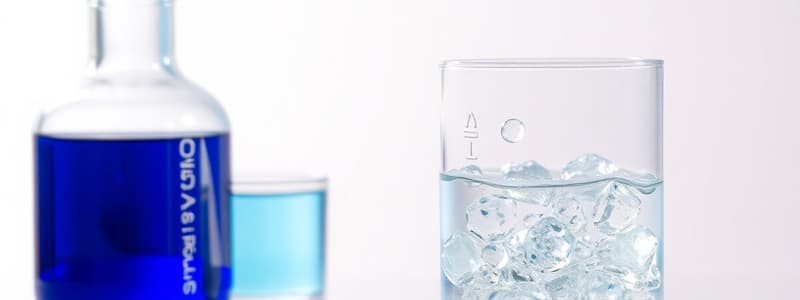Podcast
Questions and Answers
What are solutes in an aqueous solution?
What are solutes in an aqueous solution?
- The only component of a solution
- Substances dissolved in the solvent (correct)
- Only ionic compounds in water
- Substances that do not dissolve in water
What defines a polar molecule’s ability to dissolve a solute?
What defines a polar molecule’s ability to dissolve a solute?
- The presence of high temperatures
- The solute forming ions in water (correct)
- The size of the solute
- The solute being nonpolar
What is the process called when ionic compounds dissolve in water?
What is the process called when ionic compounds dissolve in water?
- Evaporation
- Dissociation (correct)
- Hydration
- Ionization
Which of the following is an example of a soluble salt?
Which of the following is an example of a soluble salt?
What typically happens to nonpolar compounds in water?
What typically happens to nonpolar compounds in water?
Which of the following is a characteristic of acids in aqueous solutions?
Which of the following is a characteristic of acids in aqueous solutions?
What type of reaction occurs when two aqueous solutions containing ions are mixed?
What type of reaction occurs when two aqueous solutions containing ions are mixed?
What would you expect when a soluble salt dissolves in water?
What would you expect when a soluble salt dissolves in water?
Flashcards are hidden until you start studying
Study Notes
Aqueous Solutions
- When a substance dissolves in water, a solution forms
- An aqueous solution contains one or more substances called solutes dissolved in water
- Water is the solvent, the most plentiful substance in the solution
Molecular Compounds in Solution
- Sugar and alcohol are molecular compounds that exist as molecules in aqueous solutions
- Other solutes are molecular compounds that form ions when they dissolve in water
- Compounds that produce hydrogen ions in aqueous solutions are acids
Ionic Compounds in Solution
- Ionic compounds can also be solutes in aqueous solutions
- When ionic compounds dissolve in water, their ions separate in a process called dissociation
Polar and Non-polar
- Nonpolar compounds typically do not dissolve in water
- Oils are made up of large, mostly nonpolar molecules
- Because oil is generally nonpolar and does not form ions, it is not solvated by polar water molecules and so does not dissolve in water
- Nonpolar compounds tend to dissolve only in other nonpolar compounds
Salts in Solution
- Some salts are soluble in water, and others are insoluble in water.
- If the salt is soluble in water, it breaks to form ions in the aqueous solution
- If the salt is insoluble in water, it will form a precipitate (a solid that forms out of solution)
Soluble Salts
- Sodium Chloride (NaCl)
- Copper(II) Sulphate (CuSO4)
- Sodium Carbonate (Na2CO3)
Insoluble Salts
- Copper hydroxide (Cu(OH)2)
- Barium Sulphate (BaSO4)
- Barium Carbonate (BaCO3)
Polyatomic Ions
- Polyatomic ions are groups of atoms that have a charge
- Examples of common polyatomic ions include:
- Hydroxide (OH-)
- Carbonate (CO32-)
- Nitrate (NO3-)
- Sulphate (SO42-)
Group Ions
- All Group 1 elements have a +1 charge (e.g. Na+)
- All Group 2 elements have a +2 charge (e.g. Ca2+)
- All Group 6 elements have a -2 charge (e.g. O2-)
- All Group 7 elements have a -1 charge (e.g. Cl-)
Types of Reactions in Aqueous Solutions
- When two aqueous solutions that contain ions as solutes are combined, the ions might react with one another
- These reactions are always double-replacement reactions
Double-Replacement Reactions
- A double replacement reaction is a reaction where two reactants exchange partners to form new products.
- The general form of a double-replacement reaction is: AB + CD --> AD + CB
- A, B, C, and D are elements or polyatomic ions.
- In aqueous solutions, double-replacement reactions often result in the formation of a precipitate (a solid product) or a gas.
Studying That Suits You
Use AI to generate personalized quizzes and flashcards to suit your learning preferences.




